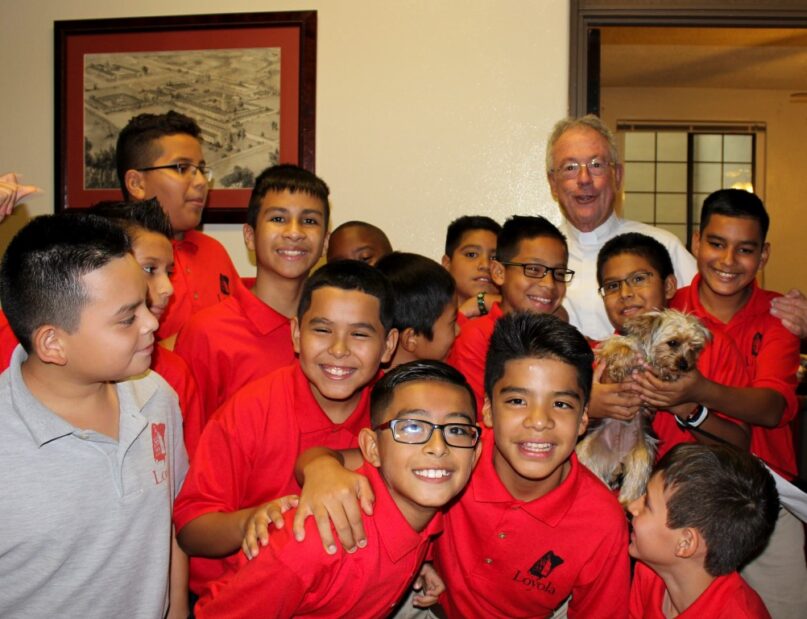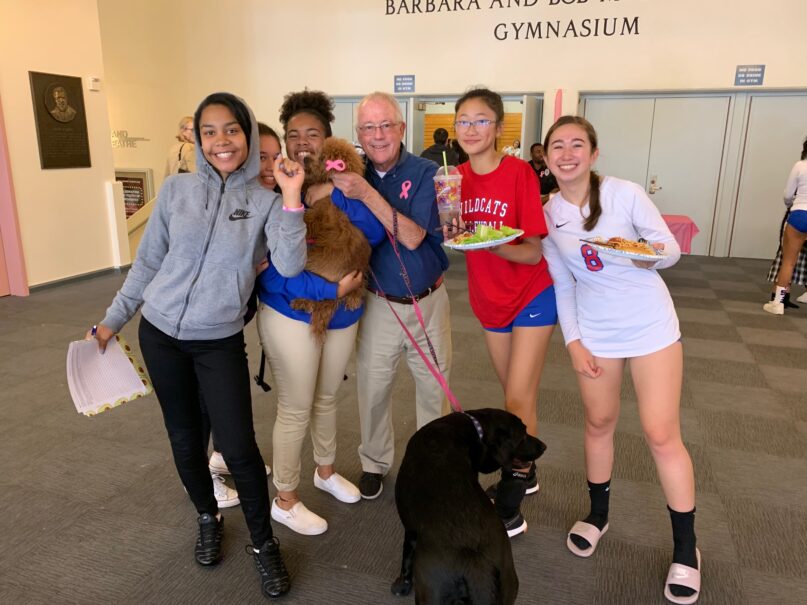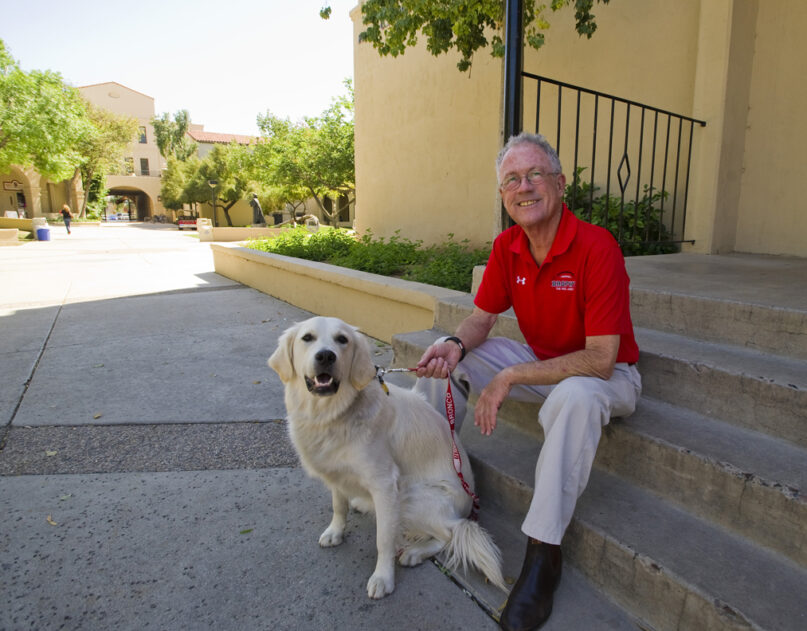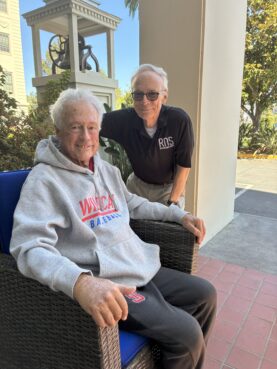(RNS) — My brother, Eddie, died early in the morning of Aug. 2, at the Jesuit infirmary in Los Gatos, California. He was 82.
Writing that sentence is painful because I have spent the last two weeks in denial, coping by keeping busy with the mundane details of a family death: notifying friends, responding to messages, cleaning out his room, wrapping up his finances, planning a funeral. Anything to keep me from thinking about losing my brother, whether it was trying to write a column on Gaza or watching Netflix.
Although we both became Jesuits, Eddie and I were very different. He was an extrovert who made friends easily. I find social interaction exhausting; I would rather read a book. Ministry forced me to be more extroverted; for Eddie it came naturally.
Eddie loved secondary education. For me, two years of teaching high school boys motivated me to earn a Ph.D. so I would never have to enter a high school classroom again.
Eddie used to refer to me as the “famous Father Reese” because I was often quoted in the media, but in San Jose, Phoenix and San Francisco he was known to thousands of people as a giant in Jesuit education and a friend.
For 14 years, from 1980-1994, he was principal at Bellarmine Prep in San Jose, where he introduced personal computers before most people knew what they were. As president of Brophy Prep in Phoenix from 1996 to 2016, he raised more than $100 million to transform the campus’s physical plant. He also updated education programs so students could thrive.

Edward Reese, rear right, and Loyola Academy scholars at Brophy College Prep in Phoenix, 2015. (Photo by Adria Renke)
At St. Ignatius College Prep in San Francisco, where he became president in 2016, he significantly increased scholarships and began construction of the $200 million New Learning Commons. When it is finished it will be 165,000 square feet of flexible, sustainable space that will define Jesuit education in San Francisco for the next century.
I was most proud of what he did to get poor and minority kids into his schools. He recognized that Catholic high schools can be white enclaves for the rich. He recruited minorities and poor students but noticed that they often were frustrated because they were not prepared for the school’s rigorous academic program. So he started Loyola Academy, a middle school at Brophy, and later, the Father Sauer Academy at St. Ignatius.
The 20 or 30 children in each grade had to be poor enough to qualify for the federal lunch program. He never applied for the program, finding the paperwork too onerous. He fed the kids anyway. I remember one child being asked why he liked going to the school, and the child answered, “Now my mommy doesn’t have to worry about feeding me.”
The students were guaranteed admission to the high school and given full scholarships for seven years of schooling. He hired high-quality teachers, often ones who had worked in Teach for America programs. He got the mothers’ club to outfit the students and got doctors to give them free health care. Since the academies were on campus, the high school students were recruited to mentor the younger students, introducing them to chess and robotics.
While minority freshmen often feel out of place in a prep school, by the time they are freshmen, the academy students are the locals who introduce the new freshman to their school.

Edward Reese with his dogs Ginger and Rodger at lunch with students at St. Ignatius College Prep in San Francisco in 2019. (Photo courtesy of Reese)
The academies have been extraordinarily successful, with graduates going to college and beyond. Students who entered the program at below grade level were up to or exceeding it by the time they entered high school. Some took high school-level math classes while in middle school.
The buildings Eddie put up at Brophy and began at St. Ignatius are a visible sign of his legacy, but it was the relationship he built with students, faculty and donors that made these schools great.
He loved talking with students over lunch or while walking around campus with his two dogs, Rodger and Ginger, who he claimed were better known than he.
He had an eye for talent and surrounded himself with extraordinary colleagues. He joked that he only made about two decisions a month. He trusted his staff to do the right thing. During his last days, I heard so many people tell him how he had seen something in them that they had not, that he had changed their lives when he entrusted them with a job.
But it was not just a job they got, it was his mentoring that helped them grow into their full potential. And he was there as a priest when personal crises threatened to derail their lives. Many talked about how he was there for them at a death or divorce. He celebrated their weddings and their children’s baptisms.

Edward Reese with his dog at Brophy Prep in Phoenix. (Courtesy photo)
I listened to these stories during the last weeks of his life as people came to visit, wrote or called him. He joked, “It’s too bad you have to get cancer to find out how many people love you.”
Not that everyone loved him or his style. He had to fire people who didn’t work out. And once he decided something, like starting the Sauer Academy at St. Ignatius, he was not going to waste time debating it: “Get it done,” he would say.
His death was about as good as it could be. The first sign of trouble was when he fainted at graduation at the end of May. In June, we vacationed in Capistrano Beach, a place he had loved since childhood, where he could look out over the Pacific while listening to NPR and audio books. He joked that he knew there was something wrong when he did not want his usual Jack Daniels in the evening.
I became scared at his lack of appetite and when he was having trouble operating his iPhone. Eddie had always been an early adopter and fan of technology.
Back in San Francisco, he saw his doctor, who ordered a CT scan and blood work. It was low sodium levels that put him in the hospital over the Fourth of July weekend. While in the hospital, they took a biopsy of his liver. The hospital oncologist told him it was Stage 4 pancreatic cancer that had spread to the liver and abdominal lining.

Edward, left, and Thomas Reese at Sacred Heart Jesuit Center in Los Gatos, Calif., 2025. (Photo by Adria Renke)
A Stanford University oncologist confirmed the diagnosis and laid out the treatment options. Treatment might delay death, but there was no cure. He was never going back to work. He chose the alternative: hospice care. He did not want to spend the remainder of his life going to doctors’ appointments and getting tested and treated.
Instead, he spent his time at the Jesuit retirement home in Los Gatos, visiting with friends, talking on the phone and responding to text messages and emails. It was my privilege and joy to sit with him during this time. We had lived and worked at opposite ends of the continent for 50 years, and I learned more about him in these last weeks listening to these conversations than I had in decades.
During his last days at Los Gatos, he received the Sacrament of the Sick in the infirmary chapel. I insisted that it be done while he was still able to appreciate what was happening. It was a moving experience. The chapel was filled with Jesuits, many with walkers or wheelchairs. With not enough room in the chapel, gridlock set in in the hallway as others gathered outside.
At the conclusion of the ceremony, everyone was able to individually greet and bless Eddie. Many were classmates and colleagues who had worked with him. All were old friends. All knew that they were going to be joining him within a few years.
Visitors often asked him if he was in pain. “Now that you ask, it is a little uncomfortable here,” he said, pointing to his stomach. Only at the end did he ask for morphine. The next day he did not regain consciousness, and the following morning at 1:30 a.m., I noticed he was not breathing. His passing was quiet and peaceful.
“Cancer sucks,” as Eddie said, but the care he received from the Jesuits and nurses at Los Gatos was extraordinary. He left this world surrounded by love of colleagues and friends. I hope I die the same way. I was privileged to be his brother. I will miss him.
“May the angels lead you into paradise; may the martyrs come to welcome you and take you to the holy city, the new and eternal Jerusalem. May choirs of angels welcome you and lead you to the bosom of Abraham; and where Lazarus is poor no longer may you find eternal rest.”





